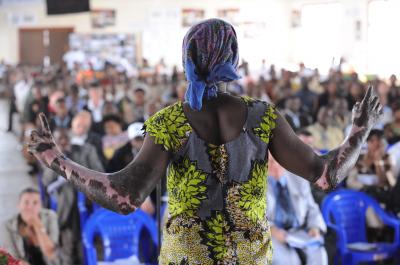Violence against women in post-conflict states: The role of the UN and women's organisations
How do the post-conflict peace consolidation efforts of international organisations affect the security of women? Can these organisations have a direct impact on states' responses to violence against women? In this seminar, Peace Medie, ‘Funmi Olonisakin and Alice Hills discuss the role of the UN and women's organisations in responding to violence against women in post-conflict states.
Speakers:
Alice Hills, Professor of Conflict Studies in the School of Government and International Affairs, Durham University
Peace Medie, Global Leaders Fellow and Research Fellow, Legon Centre for International Affairs and Diplomacy (LECIAD), University of Ghana
Speaker profiles:
Professor Alice Hills is a Professor of Conflict Studies and Research Director at Durham University’s School of Government and International Affairs. Before joining Durham she was professor of conflict and security at the University of Leeds, where she acted as Research Director and Unit of Assessment leader for POLIS. There her research and teaching focused on security governance in fragile states, counter-insurgency in cities, and the relationship between security and development. Prior to that she taught defence studies at the UK's Joint Services Command and Staff College where she specialised in urban operations and police-military relations. She earned a PhD in War studies from the University of London. Alice's personal research agenda concerns police development, police-military relations, post-conflict policing and sub-state security. The core of her research is to develop a comparative framework for analysing why police forces evolve as they do, and what explains their interaction with governments, militaries and societies in sub-Saharan Africa. She is on the Editorial Board of Small wars and Insurgencies, and of Governance in Africa.
Professor ’Funmi Olonisakin is the founding Director of the African Leadership Centre, which aims to build the next generation of African leaders in the fields of peace, security and development. She has served as the Director of the Conflict, Security and Development Group at King’s College London since 2003; and she is a Research Associate with the Department of Political Science, University of Pretoria, South Africa. Prior to this, she worked in the Office of the United Nations Special Representative of the Secretary-General on Children and Armed Conflict as Adviser on Africa. She previously held research positions in the Centre for Defence Studies, King’s College London, where she co-Directed the African Security Unit; the Institute for Strategic Studies in the University of Pretoria, South Africa; and the Department of Political Science, University of Lagos Nigeria.
Dr Peace A. Medie is a Global Leaders Fellow (GLF) at GEG. She is a research fellow in the Legon Centre for International Affairs and Diplomacy (LECIAD) at the University of Ghana. Her research and teaching interests include international relations, gender and international security, and civilian protection. She is affiliated with the University of Ghana’s Centre for Gender Studies and Advocacy. Previously, she was a dissertation fellow in the African and African Diaspora Studies Program at Boston College.Dr Medie’s ongoing research project studies how international organizations and women’s movements influence states’ enforcement of gender-based violence laws. In 2010 and 2011, she conducted over 150 interviews in Liberia with a range of state and non-state actors for this study. Papers resulting from this project have won the Best Graduate Student Paper Award from the African Politics Conference Group and the Graduate Student Paper Prize from the National Women Studies Association’s Women of Color caucus. The findings have appeared in African Affairs.

